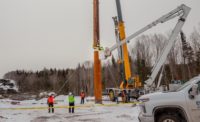Voters cast their support in three New England states for ballot measures that include support for school renovations in Rhode Island, repair, and maintenance of public infrastructure in Massachusetts and construction of a new high school in Vermont.
Rhode Island ballot initiatives to issue $250 million in bonds to construct and renovate public school buildings and $100 million in bonds for the University of Rhode Island’s Narragansett Bay campus were expected to pass with with overwhelming approval on Nov. 9, when approximately 92% of votes were in about 24 hours after polls closed.
The Rhode Island Associated General Contractors supported the measures. Kerrie Bennett, RIAGC executive director says voters passed an initial $250 million bond in 2018. Bennett says the measure on this year's ballot "is the second part of this once-in-a-generation investment to make schools safer, energy efficient, and more relevant for learning with labs and technical capabilities. The state’s robust and coordinated effort has provided a roadmap for planning for all involved in large-scale commercial construction... In addition to the opportunities to bid on this work, question two will also support workforce development in the building trades through apprenticeship, as some cities and towns will likely have this requirement as part of their projects."
University of Rhode Island President Marc Parlange at a Sept. 28 kickoff with Gov. Dan McKee said, “With the support of this [$100 million] bond, URI can create a thriving, modern Bay Campus that will spur critical job creation and economic development, drive innovation, and create sustainable and equitable career opportunities for all Rhode Islanders.”
In Providence, voters supported a ballot question to increases the purchasing threshold from $5,000 to $10,0000 for regular purchasing and $20,000 for construction contracting.
In Massachusetts, a ballot question known as the Millionaire’s Tax was projected the winner on Nov. 9 when more than 90% of the votes were cast. The measure proposes a 4% tax on incomes of more than $1 million, with proceeds to go to “public education, public colleges and universities” and “repair and maintenance of roads, bridges and public transportation,” according to the office of the Secretary of the Commonwealth.
John Ferrante, chief executive at the Associated General Contractor, Massachusetts, says question one is complex with much “downside, but some potential upside.” Mass AGC did not take a formal position on it.
“If family [construction] businesses organized as S Corporations… have grown large enough over the years to pass through significant profits, they may now be hurt by the graduated income tax,” he says. In addition, even smaller business owners wanting to sell their business as part of their retirement strategy may have to factor in the additional tax burden into their financial decision making.”
However, if the question functions as supporters suggest, “we hope the legislature will use the additional revenue for investments in capital improvements of schools and infrastructure,” Ferrante says. “Our fear would be that the legislature may instead divert existing funding to be backfilled by the revenue provided by question one or they may use the revenue to just increase compensation for public employees in the transportation and education sectors,” he says.
In Burlington Vt., voters on Nov. 8 voiced strong support for a $165 million bond that would allow for the start of construction of a new high school. The total cost is an estimated$190 million.
Nearly 1,000 students are in need of a new high school as they are currently attending classes in an old Macy’s department store. After classes went remote and the campus shut down in 2020 due to the Covid-19 pandemic, students were moved to the windowless department store building. Plans to renovate the high school using a previously approved $70 million bond were nixed when elevated levels of polychlorinated biphenyls (PCBs) were found on their campus.






Post a comment to this article
Report Abusive Comment